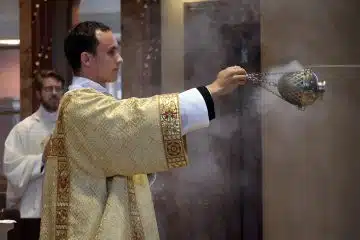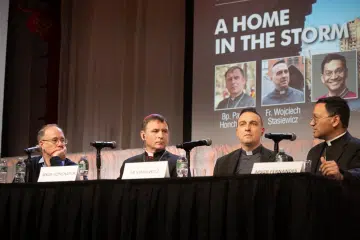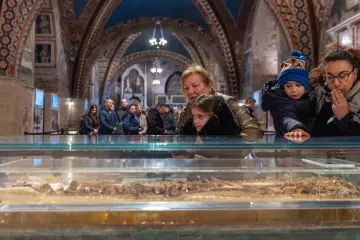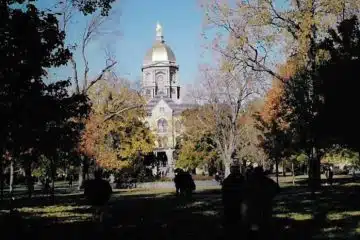Disinterested Giving in Truman Capote’s “A Christmas Memory”
In his January 16, 1980, general audience, Pope St. John Paul II noted that the second creation account in Genesis affirms two essential truths about the human person. The first is that the human is the only creature that God “willed for its own sake.” All other created things are ordered for the benefit of the human person as the crown of creation. The second truth is that the human person “can find himself only in the disinterested giving of himself.” Pope St. John Paul II uses the nakedness of the man and woman in the garden as a metaphor for the transparency and vulnerability that are necessary qualities of self-giving. “[A]t the root of their nakedness is the interior freedom of … the disinterested gift of oneself.”
In his 1981 Apostolic Exhortation, Familiaris Consortio, the pope develops this idea more fully. “[T]his free giving,” he explains, “takes the form of heartfelt acceptance, encounter and dialogue, disinterested availability, generous service and deep solidarity” (emphasis added). By his use of the term “disinterested,” Pope St. John Paul II is not saying that authentic availability is unconcerned with the good of the other, nor that it is cold or detached. Rather, he means that availability — along with “service,” “dedication” and “help”— are to be given without any expectation of something in return. As the human person is willed by God for his own sake, we are called to serve others solely for their benefit, and not with the expectation of something in return.
Truman Capote’s 1956 short story “A Christmas Memory” is a lovely portrait of two people who have nothing to give one another but disinterested availability, and who love one another solely for the sake of the other. As such, the story is perfect Christmastime reading, illustrating the selfless nature of “love in action.”
Based loosely on Capote’s childhood, “A Christmas Memory” is the first-person account of a pre-teen orphaned boy, Buddy, about his relationship with an unnamed 60-something distant cousin, whom Buddy simply calls his “friend.” Buddy’s friend is cognitively impaired in some way, exhibiting emotional maturity that is roughly equivalent with Buddy, who is seven-years-old as the story begins. Buddy and his friend live in a house with “other people,” who, Buddy explains, “have power over us, and frequently make us cry.” But Buddy and his cousin take solace in one another’s company. “We are each other’s best friend,” he explains.
The story’s fulcrum is Buddy and his friend’s annual ritual of making fruitcakes to give away as Christmas gifts. The process begins with the backbreaking work of gathering windfall pecans “among the concealing leaves, the frosted, deceiving grass” in a nearby orchard, whose trees have otherwise been picked clean by its owner. Buddy and his friend then turn to counting the money they saved since last Christmas to purchase the remaining ingredients from the grocery store.
Through various creative endeavors, they accumulated a “Fruitcake Fund.”
Having gathered the ingredients, Buddy and his friend spend the next four days making 31 fruitcakes for Christmas gifts. “Who are they for?” asks Buddy rhetorically, knowing they are mostly for people who he and his friend met only once, and many never at all: Passers-by of their rural southern home, for example, who they only waved to from the porch; the “California couple whose car one afternoon broke down outside the house and who spent a pleasant hour chatting with us on the porch”; the Baptist missionaries from Borneo who lectured once at a nearby church; the knife sharpener who passes by twice a year. And President Roosevelt.
In no case, however, do they give fruitcakes to anyone who gives them a gift in return. Instead, Buddy and his cousin are gratified by “thank-you’s on White House stationary, time- to-time communications from California and Borneo, the knife-grinder’s penny postcards.” These tokens of gratitude, explains Buddy, “make us feel connected to eventful worlds beyond the kitchen.”
As Christmas nears, Buddy and his friend separately prepare the meager homemade gifts they will present to one another on Christmas morning. They both work diligently in secret, spending love in lieu of money, wishing they could give one another more. In the innocence of her simplicity, Buddy’s friend says, “It’s bad enough in life to do without something you want; but confound it, what gets my goat is not being able to give somebody something you want them to have.” And thus, she gets to the essence of Pope St. John Paul II’s notion of “disinterested” love.
I have been careful to leave out significant narrative details of “A Christmas Memory,” because I don’t want to spoil it for those who have not read it. Suffice it to say, however, that those details merely fill out—often hilariously—the details of Buddy and his friend’s disinterested availability to one another. In his story, Capote shows you love in action. And don’t be surprised if he makes you cry along the way.
 Dr. Kenneth Craycraft is an attorney and the James J. Gardner Family Chair of Moral Theology at Mount St. Mary’s Seminary & School of Theology.
Dr. Kenneth Craycraft is an attorney and the James J. Gardner Family Chair of Moral Theology at Mount St. Mary’s Seminary & School of Theology.
This article appeared in the December 2023 edition of The Catholic Telegraph Magazine. For your complimentary subscription, click here.













